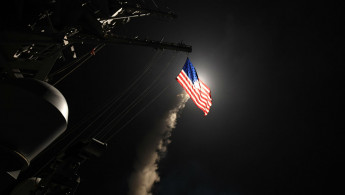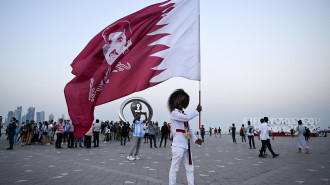Assad's opponents and supporters double-down after US missile strike
Supporters and opponents of Syrian President Bashar al-Assad have doubled down on their positions in the aftermath of US President Donald Trump's cruise missile strike on a Syrian airbase on Friday.
The New York Times noted that Trump's Tomahawk strike, launched in response to a Syrian regime chemical attack on the town of Khan Sheikhoun earlier in the same week, has "cemented Russia's embrace" of Assad.
Iran, Assad's staunchest supporter, has bitterly condemned the strike. Both countries issued a joint statement in which they stated they would "respond with force to any aggressor or any breach of red lines from whoever it is and America knows our ability to respond well".
Meanwhile, Washington has vowed to increase pressure on Damascus following the strike.
 |
It's necessary to oust this regime as soon as possible from the leadership of Syria - Mevlut Cavusoglu |
 |
Turkey, a long-time supporter of the various armed groups arrayed against Assad, supported the attack and called on Assad to step down.
"It's necessary to oust this regime as soon as possible from the leadership of Syria,"declared Turkish Foreign Minister Mevlut Cavusoglu following Friday's strike.
"If he doesn't want to go, if there is no transition government, and if he continues committing humanitarian crimes, the necessary steps to oust him should be taken."
Israeli President Binyamin Netanyahu also welcomed the strike and declared "the use of chemical weapons is unacceptable". US Vice President Mike Pence thanked him "on behalf of US President Donald Trump, for Israel's strong support for the American action in Syria".
The Israeli Air Force targeted the Syrian military in Homs Province - reportedly near an area where Russian troops were operating -last month and were fired upon by Syrian long range anti-aircraft missiles. Israeli Defence Minister Avigdor Lieberman threatened to destroy Syria's air defence system if they target Israeli jets again.
The Syrian regime in turn threatened direct retaliation against any future Israeli strikes.
Moscow said Trump's strike was "a significant blow" to US-Russia relations. It suspended its "deconfliction line" with the United States - designed to prevent the two countries' air forces, which are carrying out two separate campaigns in Syria, from clashing.
| Video: What did Trump's missile strike actually hit? |
Last September, a ceasefire agreement in Syria brokered by the US and Russia collapsed shortly after the US-led coalition accidentally bombed and killed tens of Syrian soldiers misidentified as Islamic State group militants.
Then, as now, the Russians claimed those American strikes directly aided and abetted IS.
Unlike now, however, the US sought to emphasise that the September raid was an accident, and the Obama administration conveyed its regret to Damascus, through Russia, for the "unintentional loss of life of Syrian forces".
 |
One airbase is not enough. There are 26 airbases that target civilians - Mohammed Alloush |
 |
After Trump's attack the Syrian regime has already bombed Khan Sheikhoun again and continue to operate aircraft from the base Trump's Tomahawks targeted. This clearly indicates the strike failed to afflict permanent damage against its target.
The Syrian opposition welcomed the strike, but said it was "not enough". One major representative of the opposition in negotiations, Mohammed Alloush, tweeted: "One airbase is not enough. There are 26 airbases that target civilians."
Moscow also said it would build up Syria's air defences in response to Friday's attack. "[To] protect Syria's most sensitive infrastructure, a complex of measures will be implemented in the near future to strengthen and improve the effectiveness of Syrian armed forces' air defence system," said Igor Konashenkov, a Kremlin spokesman.
Washington gave Moscow a heads-up before launching its strike. Notably, none of Russia's sophisticated S-300 or S-400 air defence missiles in Syria were shot at the 59 incoming Tomahawks. Konashenkov's comments imply that Russia may pass on such weapons to the Syrians sometime in the future.
If the Russians don't send their own personnel to operate any new air defence missiles they provide the Syrian military then the regime could potentially use such weapons to try and shoot down US coalition or Israeli warplanes, which would further exacerbate existing tensions.
Whatever the outcome from last week's events, it appears clear that increasing divergence among the main players in the Syrian conflict will mean the comprehensive settlement needed to end this bloody six-year war is still likely a long way off.
Paul Iddon is a freelance journalist based in Erbil, Iraqi Kurdistan, who writes about Middle East affairs.
Follow him on Twitter: @pauliddon



